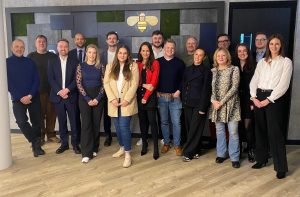Ticket to Ride: The Beatles’ ecomonic legacy revealed

THE ‘Beatles economy’ is worth nearly £82m to the economy of the Fab Four’s home city, a major report has revealed.
The band’s legacy also supports 2,335 jobs, the report produced by Liverpool John Moores University and the University of Liverpool through the Institute of Cultural Capital, European Institute of Urban Affairs and the Institute of Popular Music, reveals.
The research, based on academic work, economic date and interviews with cultural, tourism and other stakeholders, is the first study of The Beatles’ contemporary value. The report was commissioned by Liverpool City Council to evaluate the current and future economic impact of the band.
In addition to the net additional value of £81.9m generated by the band’s heritage, the report reveals that The Beatles-related economy is growing by up to 15% a year. It says there is further significant growth potential from both overseas tourism and the launch of planned developments such as the relocation of the British Music Experience to Liverpool and the potential development of Strawberry Field.
The research found that the city region’s current offer addresses the needs of both dedicated Beatles enthusiasts as well as more general visitors to the city. The report identifies a number of opportunities which could help further develop the offer, including the improvement and better management of public spaces associated with The Beatles, and developing professional knowledge and training in certain sectors of The Beatles industry.
A key challenge for the city will be to ‘curate’ and maintain the authenticity of The Beatles heritage experience for both existing and future fans and visitors – especially as new generations of visitors engage with the Beatles and Liverpool.
One of the main recommendations of the report is to establish an initial ‘Beatles Legacy’ group with representation from the main stakeholders, that will explore how to best develop the sector.
Lead author Professor Simeon Yates at the Institute of Cultural Capital, said: ” In all the interviews we conducted there was a strong belief that the city would go on attracting visitors through its Beatles connection long into the future. However, underpinning the economic impact and the cultural value of The Beatles heritage is a positive experience for fans, visitors and citizens, and the city needs to maintain standards in its efforts to promote this legacy.
“There is a risk to the city’s reputation if it does not ensure that the quality of services, attractions and products are maintained by all those who come into contact with visitors wanting to explore and access the heritage of The Beatles.”
Prof Richard Evans, of LJMU’s European Institute of Urban Affairs, added: “This report clearly shows that the Beatles legacy is of major economic benefit to the city and that there is significant potential for further growth.
“The Beatles’ close ties with Liverpool not only make dedicated attractions appealing but also boost the custom of other local visitor attractions, hotels, shops and educational establishments, and the image and standing of the city around the world.”
Dr Mike Jones, of the University of Liverpool’s Institute of Popular Music, said: “We need to convey the core point that Liverpool was not just the birthplace of The Beatles, it was their cradle; what they learned as Liverpudlians they took into the world. The self-confidence and openness to cultural influences remains a vibrant and distinctive aspect of the life of the city. The still fresh music of The Beatles reminds us who we are and who we could become.”
Mayor of Liverpool, Joe Anderson added: “We wanted a report which would use tangible evidence and analysis to tell us exactly what the legacy of The Beatles is to Liverpool.
“This now gives us a firm footing to make investment and creative decisions on how to improve the current offer of The Beatles. It will rely on all stakeholders taking ownership and driving change to unleash the full potential for our city.”








